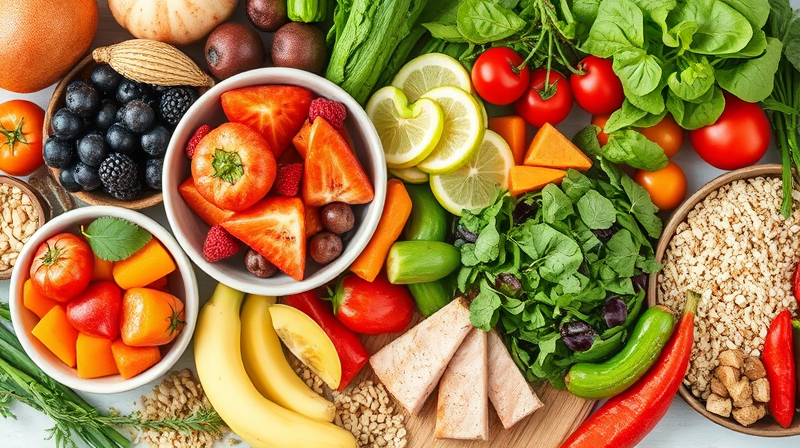A nourishing meal plan is about more than just eating; it is about embracing a lifestyle that fosters health, balance, and sustainability. Creating meal plans that reflect your unique needs can save time, reduce stress, and minimize food waste while offering nutritional benefits that support long-term wellness.
When you design a meal plan, consider the benefits of combining varied foods into delicious, balanced dishes. With thoughtful planning, every meal can become a tool for achieving a healthier lifestyle, making both your body and mind thrive.
Understanding the Basics
Begin your journey by understanding the foundation of a balanced diet. A well-rounded meal plan should include a mix of the major food groups:
- Fruits and Vegetables: Aim for at least five servings per day. Fresh, frozen, or canned fruits and vegetables that are low in added sugar or salt are the perfect way to infuse your meals with essential vitamins and minerals.
- Whole Grains: Incorporate high-fiber options like brown rice, quinoa, or whole-grain pasta to provide sustained energy. These choices also enhance digestive health.
- Lean Proteins: Choose proteins from fish, poultry, beans, lentils, tofu, and eggs, with oily fish such as salmon or mackerel recommended at least once a week for their omega-3 properties.
- Dairy and Alternatives: Include low-fat or fortified products to support calcium and vitamin D intake, essential for strong bones and overall health.
- Healthy Fats: Use unsaturated fats found in avocados, nuts, seeds, and olive oil, while avoiding excessive saturated fats to protect your heart and manage cholesterol.
By incorporating these food groups, every meal becomes an opportunity to refuel your body with balanced nutrition.
Customizing Your Meal Plan
Not all meal plans are created equal. Your individual preferences, cultural background, age, and health requirements should influence your daily menus. Embrace personalization by adapting your meals to suit your lifestyle. For instance:
- Older Adults: Focus on high-protein and nutrient-dense foods, as well as fortified options to support muscle maintenance and overall vitality.
- Young Families: Create meals that appeal to both adults and children by incorporating a colorful variety of fruits and vegetables, ensuring that everyone enjoys and benefits from a healthy diet.
- Individuals with Specific Dietary Needs: Modify recipes to support dietary restrictions or goals, ensuring balanced nutrition without compromising taste.
This customization means that your meal plan can grow with you, evolving to meet seasonal changes and life transitions.
Meal Preparation Essentials
The secret to success is planning ahead. Effective meal preparation transforms how you approach cooking and eating. Consider these essential steps:
- Organize in Advance: Dedicate a specific day each week to plan your meals, create a grocery list, and shop mindfully. Doing this regularly reduces the stress that comes with last-minute meal decisions.
- Batch Cooking and Freezing: Prepare meals in bulk and store them in individual portions in the freezer. Labeled containers ensure freshness and convenience, allowing you quick access to healthy options during hectic times.
- Stock the Pantry: Keep a well-stocked pantry with whole grains, legumes, healthy oils, spices, and canned vegetables. This setup makes assembling nutritious meals effortless even on busy days.
With these steps, meal preparation not only saves time but also inspires creativity and consistency in your diet.
Nutrition and Hydration Guidelines
Nutrition is at the heart of a healthful meal plan. Follow these guidelines to ensure optimal intake while avoiding common pitfalls:
- Limit Added Sugars and Sodium: Processed foods often contain high levels of both, so choose natural alternatives like herbs, spices, and citrus to flavor your meals.
- Stay Hydrated: Aim for 6–8 glasses of water per day, and be mindful of sugary and high-calorie beverages which can derail your health goals.
- Diversify your Menu: Experiment with themed days such as "Meatless Mondays" or "Whole Grain Wednesdays." This not only adds variety to your diet but also ensures that eating healthy remains an enjoyable adventure.
By emphasizing these elements, you set a strong foundation for both short-term energy and long-term wellness.
Reducing Food Waste and Staying Adaptive
Food waste is not only an environmental concern but also an extra strain on your budget. Smart planning helps you make the most of every ingredient:
- Place perishable items at eye level in your refrigerator to ensure they are used before spoiling.
- Get creative with leftovers, integrating them into soups, casseroles, or vibrant salads.
- Design your meals around pantry essentials to prevent unnecessary purchases and reduce waste.
Constantly monitor your progress. Evaluate how your meal plan works in real life and don't hesitate to adjust based on feedback, seasonal availability of fresh produce, or evolving nutritional needs.
The journey to better health is one of ongoing refinement. Each small change contributes to a more sustainable and nourishing lifestyle. Embrace progress, monitor results, and adapt your plans to ensure that your diet remains both enjoyable and effective.
Overall, creating a nourishing meal plan is an empowering process that transforms your daily routine into a celebration of healthy choices. With clear guidelines, an open mind, and a commitment to self-care, you have the tools to design a meal plan that nurtures your body, mind, and spirit.







